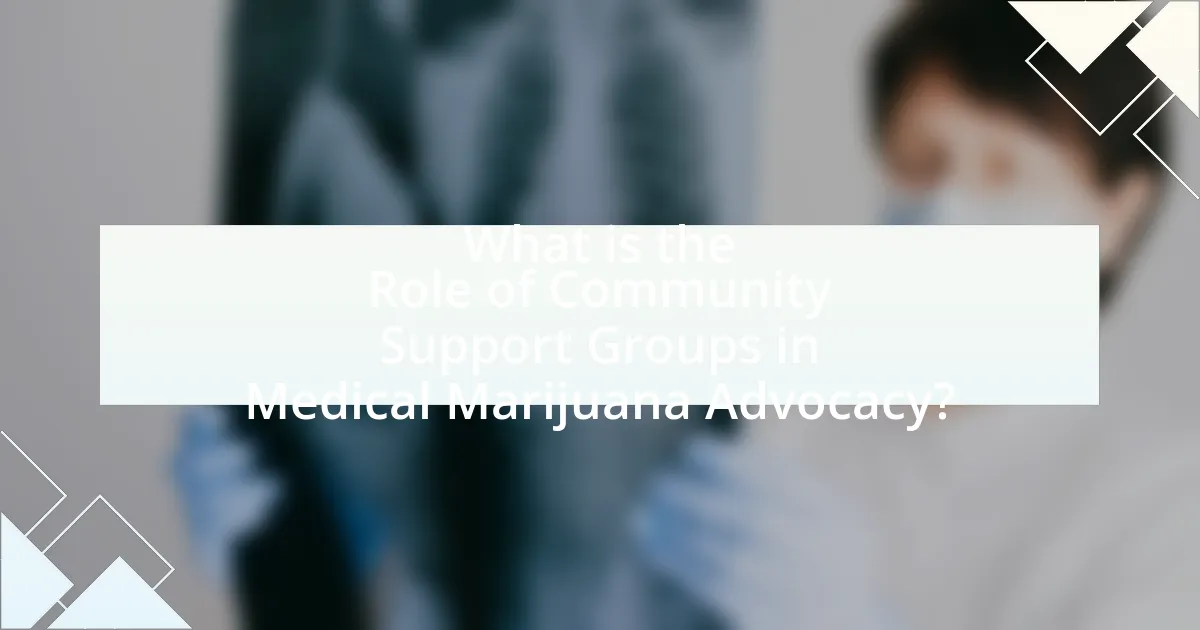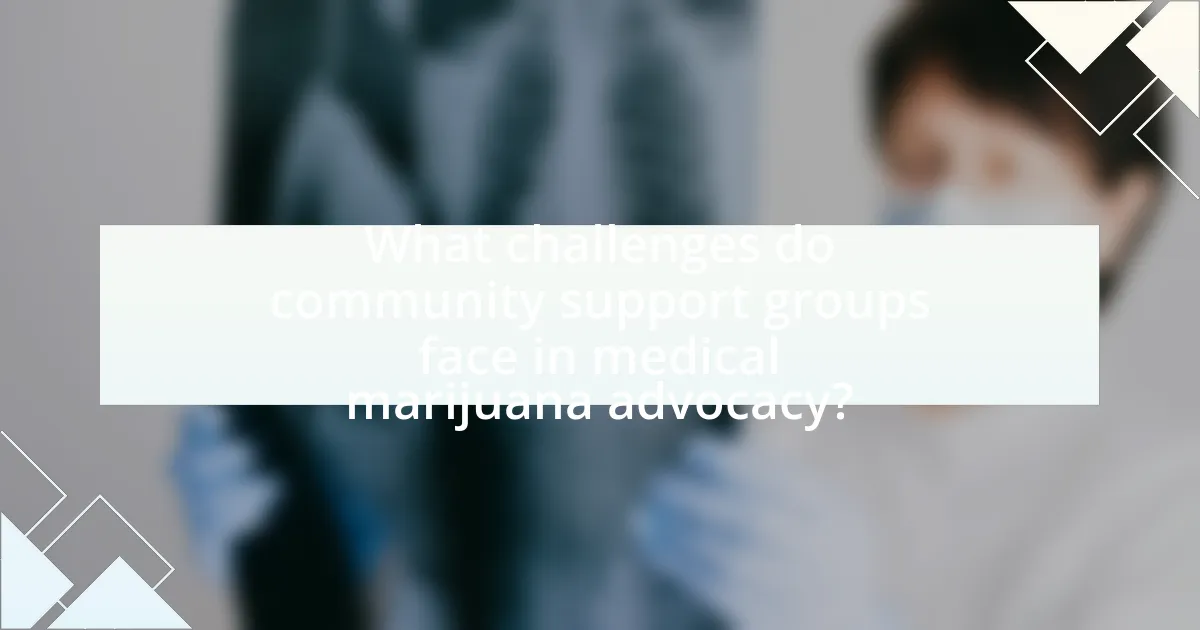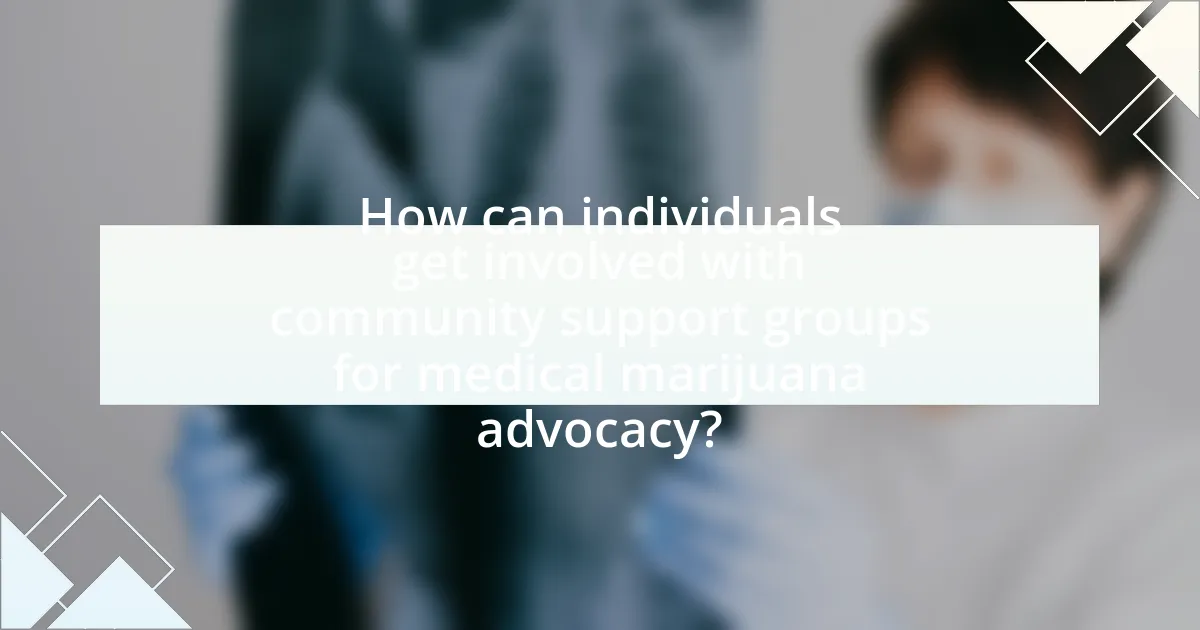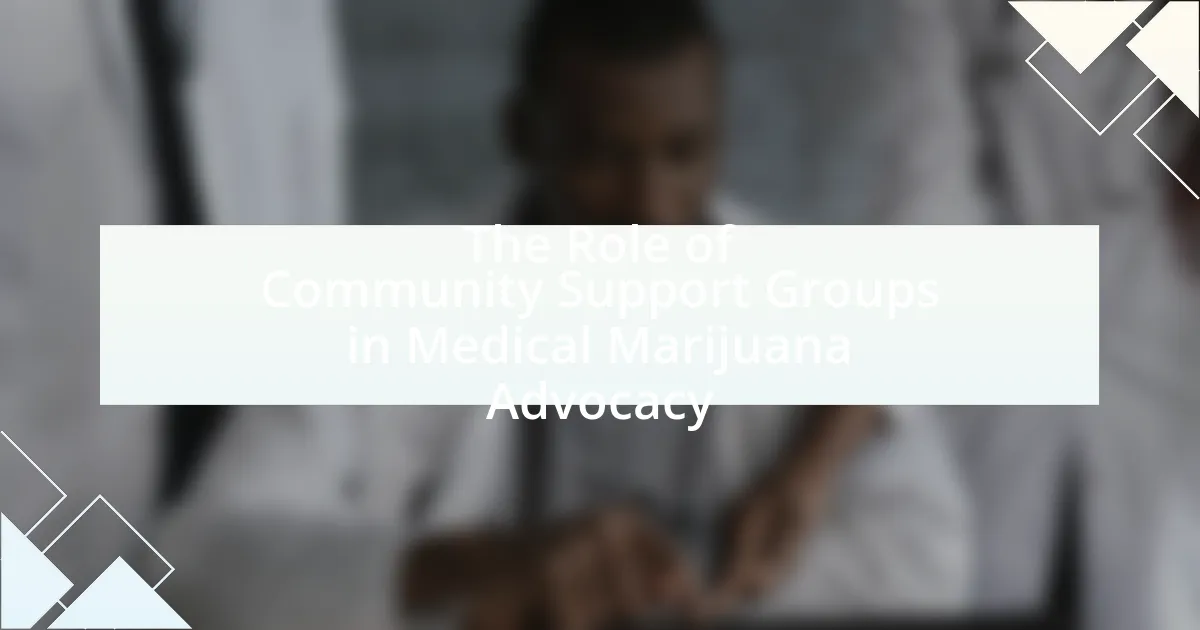Community support groups play a vital role in medical marijuana advocacy by providing education, resources, and a platform for patients and caregivers to share experiences. These groups help raise awareness about the benefits and legal aspects of medical marijuana, dispelling myths and reducing stigma. They engage in lobbying efforts to influence policy changes that promote access to medical marijuana, while also offering emotional support and practical resources to patients navigating the complexities of treatment. Additionally, community support groups face challenges such as legal restrictions and societal stigma, which they address through education, coalition-building, and grassroots mobilization.

What is the Role of Community Support Groups in Medical Marijuana Advocacy?
Community support groups play a crucial role in medical marijuana advocacy by providing education, resources, and a platform for patients and caregivers to share experiences. These groups facilitate awareness about the benefits and legal aspects of medical marijuana, helping to dispel myths and reduce stigma associated with its use. For instance, studies have shown that peer support can significantly improve patients’ understanding of treatment options and enhance their ability to navigate the healthcare system. Additionally, community support groups often engage in lobbying efforts, mobilizing members to advocate for policy changes that promote access to medical marijuana, thereby influencing legislation at local and state levels.
How do community support groups contribute to medical marijuana advocacy?
Community support groups significantly contribute to medical marijuana advocacy by providing a platform for education, awareness, and collective action. These groups facilitate the sharing of personal experiences and medical information, which helps to demystify medical marijuana and reduce stigma. For instance, studies have shown that patient testimonials can influence public opinion and policy decisions, as seen in states where advocacy groups successfully lobbied for legalization based on patient needs. Additionally, community support groups often organize events, campaigns, and outreach programs that mobilize community members and engage policymakers, thereby amplifying the voices of patients and caregivers in the legislative process.
What specific functions do these groups serve in the advocacy process?
Community support groups in medical marijuana advocacy serve several specific functions, including raising awareness, providing education, mobilizing community action, and influencing policy change. These groups raise awareness by disseminating information about the benefits and legal status of medical marijuana, which helps to shift public perception. They provide education through workshops and informational sessions, equipping individuals with knowledge about medical marijuana’s therapeutic uses and legal implications. Mobilizing community action involves organizing events, rallies, and campaigns that unite supporters and demonstrate public demand for policy reform. Lastly, these groups influence policy change by lobbying lawmakers, participating in public hearings, and collaborating with other advocacy organizations to promote legislation that supports medical marijuana access. For instance, the National Organization for the Reform of Marijuana Laws (NORML) has successfully advocated for changes in marijuana laws across various states, demonstrating the effectiveness of community support groups in the advocacy process.
How do community support groups mobilize public opinion on medical marijuana?
Community support groups mobilize public opinion on medical marijuana by organizing educational campaigns, facilitating discussions, and advocating for policy changes. These groups often host events, distribute informational materials, and utilize social media platforms to raise awareness about the benefits and legality of medical marijuana. For instance, a study by the National Organization for the Reform of Marijuana Laws (NORML) highlights that grassroots efforts significantly influence public perception, with 60% of surveyed individuals reporting increased support for medical marijuana after attending community events. This demonstrates that community support groups effectively shape public opinion through direct engagement and information dissemination.
Why are community support groups essential for patients seeking medical marijuana?
Community support groups are essential for patients seeking medical marijuana because they provide a platform for shared experiences, education, and emotional support. These groups facilitate connections among patients, allowing them to exchange information about effective strains, dosages, and methods of consumption, which can enhance treatment outcomes. Research indicates that peer support significantly improves patients’ adherence to treatment plans and reduces feelings of isolation, which is crucial for those navigating the complexities of medical marijuana use. Furthermore, community support groups often advocate for patients’ rights and access to medical marijuana, influencing policy changes that benefit the broader patient community.
What resources do these groups provide to patients and their families?
Community support groups in medical marijuana advocacy provide various resources to patients and their families, including educational materials, emotional support, and access to legal guidance. These groups often distribute pamphlets and host workshops that inform patients about the benefits and risks of medical marijuana, helping them make informed decisions about their treatment options. Additionally, they offer peer support networks where individuals can share experiences and coping strategies, fostering a sense of community. Legal resources may include referrals to attorneys specializing in medical marijuana laws, ensuring that patients understand their rights and navigate the legal landscape effectively.
How do support groups facilitate access to medical marijuana for patients?
Support groups facilitate access to medical marijuana for patients by providing education, resources, and advocacy. These groups often offer information on the legal requirements for obtaining medical marijuana, assist in navigating the application process for medical marijuana cards, and connect patients with healthcare professionals who can prescribe it. For instance, studies have shown that patients who participate in support groups report higher levels of understanding regarding the medical marijuana laws in their state, which directly impacts their ability to access treatment. Additionally, support groups create a community where patients can share experiences and recommendations, further enhancing their ability to obtain necessary medical marijuana.

What challenges do community support groups face in medical marijuana advocacy?
Community support groups face significant challenges in medical marijuana advocacy, primarily due to legal restrictions and societal stigma. These groups often struggle to navigate complex and varying state laws regarding medical marijuana, which can hinder their ability to provide accurate information and support to patients. Additionally, societal stigma surrounding marijuana use can lead to public resistance and misunderstanding, making it difficult for these groups to gain traction and support within their communities. Research indicates that approximately 60% of Americans still hold negative views about marijuana, which complicates advocacy efforts and limits the outreach capabilities of community support groups.
How do legal and regulatory issues impact community support groups?
Legal and regulatory issues significantly impact community support groups by shaping their operational framework and influencing their ability to advocate effectively. These groups often rely on specific laws and regulations regarding medical marijuana to guide their activities, including patient education, resource distribution, and lobbying efforts. For instance, in regions where medical marijuana is legalized, support groups can operate more freely, providing essential services and fostering community engagement. Conversely, in areas with restrictive laws, these groups may face legal challenges that hinder their operations, limit their outreach, and reduce their effectiveness in advocating for patients’ rights. The National Organization for the Reform of Marijuana Laws (NORML) has documented that legal barriers can lead to decreased participation in support groups, as potential members may fear legal repercussions. Thus, the legal landscape directly influences the viability and impact of community support groups in the realm of medical marijuana advocacy.
What are the common legal barriers faced by these groups?
Common legal barriers faced by community support groups in medical marijuana advocacy include restrictive state laws, lack of federal recognition, and challenges in accessing banking services. These groups often operate in a legal gray area due to varying state regulations that can criminalize their activities despite state-level legalization. For instance, as of 2023, 37 states have legalized medical marijuana, but federal law still classifies it as a Schedule I substance, creating a conflict that complicates advocacy efforts. Additionally, many banks refuse to provide services to marijuana-related businesses due to federal regulations, limiting financial support for advocacy initiatives.
How do changes in legislation affect the operations of support groups?
Changes in legislation significantly impact the operations of support groups by altering the legal framework within which they function. For instance, when laws regarding medical marijuana are enacted or amended, support groups may need to adjust their advocacy strategies, educational materials, and outreach efforts to align with new regulations. Additionally, changes in legislation can affect funding opportunities, as certain grants or donations may be contingent upon compliance with legal standards. A study by the National Organization for the Reform of Marijuana Laws (NORML) highlights that support groups often experience increased membership and engagement during legislative changes, as individuals seek community and resources to navigate new legal landscapes.
What strategies do community support groups use to overcome challenges?
Community support groups utilize several strategies to overcome challenges in medical marijuana advocacy, including education, coalition-building, and grassroots mobilization. Education involves providing accurate information about medical marijuana to dispel myths and inform both the public and policymakers, which is crucial for changing perceptions and laws. Coalition-building allows these groups to unite with other organizations, enhancing their influence and resources, as seen in successful campaigns like the 2016 California Proposition 64, which legalized recreational marijuana. Grassroots mobilization engages community members to participate in advocacy efforts, such as organizing rallies or contacting legislators, which has proven effective in states like Colorado, where community efforts significantly contributed to the legalization process. These strategies collectively empower community support groups to navigate and address the complexities of medical marijuana advocacy effectively.
How do these groups engage with policymakers and stakeholders?
Community support groups engage with policymakers and stakeholders through organized advocacy efforts, including lobbying, public awareness campaigns, and participation in public forums. These groups often mobilize their members to communicate directly with legislators, sharing personal stories and data that highlight the benefits of medical marijuana, thereby influencing policy decisions. For instance, studies have shown that grassroots movements can significantly impact legislative outcomes, as seen in states where community groups successfully advocated for the legalization of medical marijuana, resulting in changes to state laws and regulations.
What role does education play in their advocacy efforts?
Education plays a crucial role in the advocacy efforts of community support groups in medical marijuana. It equips advocates with the knowledge necessary to inform the public and policymakers about the benefits and risks associated with medical marijuana use. For instance, studies have shown that informed advocates can effectively counteract misinformation and stigma surrounding medical marijuana, leading to more supportive legislation. Additionally, educational initiatives often include workshops and seminars that empower community members to share their experiences and insights, thereby fostering a more informed and engaged community. This collective knowledge enhances the credibility of advocacy efforts and can lead to increased public support and policy change.

How can individuals get involved with community support groups for medical marijuana advocacy?
Individuals can get involved with community support groups for medical marijuana advocacy by attending local meetings, joining online forums, and volunteering for advocacy events. Many support groups organize regular gatherings where members discuss issues, share experiences, and plan advocacy efforts, providing a platform for individuals to engage actively. Additionally, online platforms such as social media groups and dedicated websites offer resources and networking opportunities for those interested in advocacy. According to the National Organization for the Reform of Marijuana Laws (NORML), community involvement is crucial for raising awareness and influencing policy changes regarding medical marijuana.
What are the benefits of joining a community support group?
Joining a community support group provides emotional support, shared experiences, and access to valuable resources. These groups foster a sense of belonging and reduce feelings of isolation, which is particularly beneficial for individuals navigating challenges related to medical marijuana use. Research indicates that participants in support groups report improved mental health outcomes, as they can discuss their experiences openly and receive encouragement from peers facing similar situations. Additionally, community support groups often provide educational resources and advocacy tools, empowering members to make informed decisions about their health and engage effectively in discussions about medical marijuana policies.
How can participation in these groups enhance personal advocacy efforts?
Participation in community support groups enhances personal advocacy efforts by providing individuals with shared experiences, resources, and collective knowledge. These groups foster a sense of belonging and empowerment, enabling members to articulate their needs and concerns more effectively. Research indicates that individuals involved in support groups report increased confidence in advocating for their rights and access to medical marijuana, as they learn from others’ successes and challenges. For instance, a study published in the Journal of Psychoactive Drugs found that peer support significantly improved participants’ advocacy skills and knowledge about medical marijuana legislation. This collective approach amplifies individual voices, making advocacy efforts more impactful and informed.
What skills or knowledge can individuals gain from involvement?
Individuals can gain advocacy skills, knowledge of medical marijuana legislation, and community engagement techniques from involvement in community support groups. Advocacy skills are developed through participation in discussions and campaigns, enabling individuals to effectively communicate the benefits and challenges of medical marijuana. Knowledge of medical marijuana legislation is acquired as members learn about local, state, and federal laws, which enhances their ability to navigate the legal landscape. Community engagement techniques are honed through organizing events and outreach efforts, fostering collaboration and support among members. These skills and knowledge contribute to a more informed and active community in the realm of medical marijuana advocacy.
What are some best practices for effective community support group participation?
Effective community support group participation involves active listening, sharing personal experiences, and maintaining confidentiality. Active listening fosters a supportive environment, allowing members to feel heard and valued. Sharing personal experiences encourages openness and connection among participants, which can enhance the group’s effectiveness in addressing shared challenges. Maintaining confidentiality is crucial, as it builds trust and ensures that members feel safe discussing sensitive topics. Research indicates that groups with high levels of trust and open communication are more successful in achieving their goals, particularly in advocacy contexts like medical marijuana.
How can members contribute to the group’s mission and goals?
Members can contribute to the group’s mission and goals by actively participating in advocacy efforts, sharing personal experiences, and educating others about medical marijuana. Active participation includes attending meetings, volunteering for events, and engaging in outreach activities that promote awareness and understanding of medical marijuana’s benefits. Sharing personal experiences helps to humanize the issue and can influence public perception, while educating others provides critical information that can dispel myths and misinformation surrounding medical marijuana. These contributions collectively strengthen the group’s impact and effectiveness in advocating for policy changes and community support.
What are the most effective ways to share personal experiences within the group?
The most effective ways to share personal experiences within the group include structured storytelling, active listening, and creating a safe environment for open dialogue. Structured storytelling allows individuals to present their experiences in a coherent manner, which enhances understanding and relatability among group members. Active listening fosters empathy and connection, as participants feel heard and validated. Creating a safe environment encourages openness, reducing fear of judgment and promoting honest sharing. Research indicates that groups that implement these strategies report higher levels of engagement and support, leading to more effective advocacy efforts in medical marijuana communities.
What resources are available for those interested in community support groups?
Community support groups for medical marijuana advocacy can be accessed through various resources, including online platforms, local organizations, and educational materials. Websites such as the National Organization for the Reform of Marijuana Laws (NORML) provide information on local chapters and support networks. Additionally, social media groups on platforms like Facebook and Reddit facilitate community engagement and sharing of experiences among members. Local health departments and advocacy organizations often host meetings and workshops, offering opportunities for individuals to connect and learn about medical marijuana. Research indicates that community support groups can enhance patient knowledge and improve access to medical marijuana resources, as highlighted in studies published by the Journal of Psychoactive Drugs.
Where can individuals find local community support groups focused on medical marijuana?
Individuals can find local community support groups focused on medical marijuana through various resources such as online directories, social media platforms, and local health organizations. Websites like Meetup and Facebook often host groups dedicated to medical marijuana advocacy and support, allowing individuals to connect with others in their area. Additionally, local chapters of national organizations, such as the National Organization for the Reform of Marijuana Laws (NORML) or the Marijuana Policy Project, frequently provide information on community events and support groups. These resources are validated by their widespread use and the active participation of individuals seeking support and information regarding medical marijuana.
What online platforms exist for connecting with support groups nationwide?
Online platforms that connect individuals with support groups nationwide include Facebook Groups, Meetup, and Reddit. Facebook Groups allow users to join specific communities focused on various topics, including medical marijuana advocacy, facilitating discussions and support. Meetup provides a platform for organizing in-person and virtual gatherings, enabling users to find local support groups. Reddit hosts numerous subreddits dedicated to medical marijuana, where users can share experiences and seek advice from a larger community. These platforms are widely used and have proven effective in fostering connections among individuals seeking support.

Leave a Reply